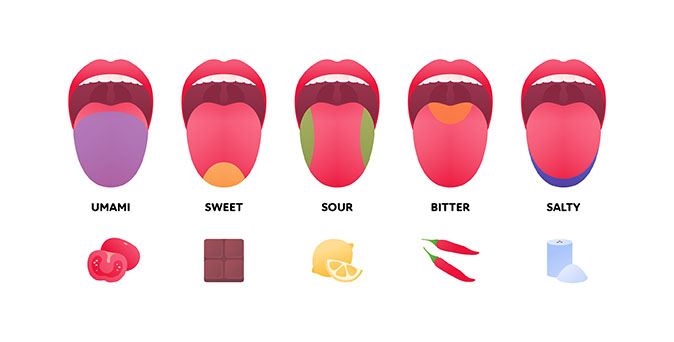
< Back
sour
Definition
In science, sourness is a taste that is caused by the presence of acids. Acids are chemical compounds that release hydrogen ions (H+) when they dissolve in water.
The sour taste is detected by taste receptors on the tongue that are sensitive to hydrogen ions. When these receptors come into contact with an acid, they send a signal to the brain that the food is sour.
The strength of the sour taste depends on the concentration of hydrogen ions in the food. The higher the concentration of hydrogen ions, the stronger the sour taste.
Some common acids that cause a sour taste include:
- Citric acid: Found in citrus fruits, such as lemons and limes.
- Acetic acid: Found in vinegar.
- Lactic acid: Found in sour milk and yoghurt.
How can the word be used?
The milk turned sour because it was left out too long.

Different forms of the word
Adjective: Having a sharp, acid taste.
Verb: To make or become sour.
Noun: A sour substance or thing.
Etymology
The etymology of the word "sour" can be traced back to the Old English word "sūr", which also meant "sour". This word is thought to come from the Proto-Germanic word *sūraz, which also meant "sour". The Proto-Germanic word is ultimately derived from the Proto-Indo-European word *súHros, which also meant "sour".
Question
What foods are sour in taste?
AQA Science Exam Question and Answer
Question:
Explain the sensation of sourness in terms of taste perception and the chemical compounds responsible for this taste, providing examples of sour-tasting substances.
Answer:
Sourness is a distinct taste perception that our taste buds recognise when exposed to certain acidic compounds. This taste sensation is primarily detected on the sides of the tongue.
The sensation of sourness is a result of the presence of hydrogen ions (H+) from acidic substances. When these hydrogen ions interact with taste receptors on the tongue, they trigger nerve signals to the brain, creating the perception of sourness. This sensation is often associated with the taste of fruits such as lemons, limes, and oranges, which contain citric acid, a prominent sour-tasting compound.
Other examples of sour-tasting substances include vinegar, which contains acetic acid, and sour candies which may contain various types of acids like malic acid or tartaric acid. Fermented foods like yoghurt and pickles also offer a sour taste due to the presence of lactic acid and other organic acids formed during the fermentation process.
Understanding the taste of sourness adds depth to our sensory experience and influences our dietary preferences. The chemical compounds responsible for sourness play a crucial role in the identification of potentially harmful or spoiled foods, contributing to our survival instincts and overall taste perception.